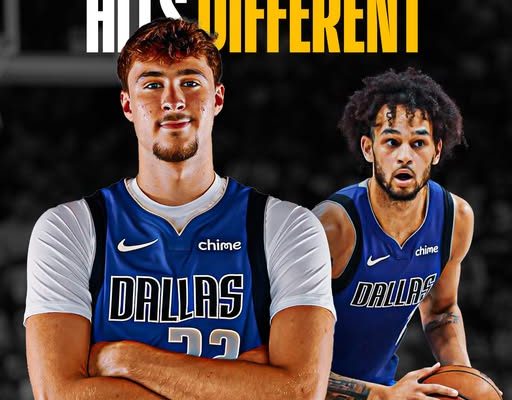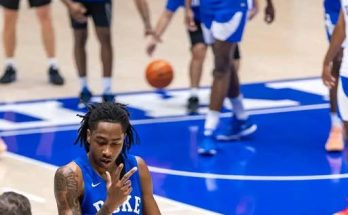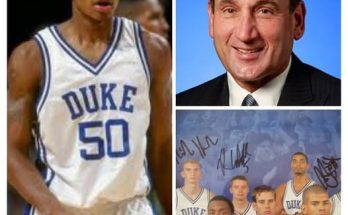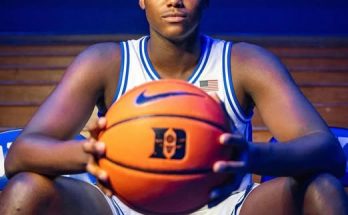The Dallas Mavericks have long sought the right pieces to complement their franchise cornerstone Luka Dončić, and in the 2025 NBA Draft, they may have unearthed a gem that even they didn’t fully anticipate would shine this bright, this fast. Cooper Flagg, the high-flying, versatile forward out of Duke, is quickly proving to be more than just a promising rookie. He’s turning into a revelation. In a league where most rookies struggle to find their rhythm amidst the grown-man pace and pressure, Flagg has entered with a confidence, humility, and maturity that has not only impressed his coaches and teammates—but has sent a surge of optimism through the Mavericks’ fanbase.
Flagg’s journey to Dallas was already steeped in hype. He had been one of the most talked-about prospects in years, drawing comparisons to top-tier two-way stars even before stepping foot on an NBA court. His blend of size, skill, and motor had scouts salivating. But what has truly separated Flagg in his early days with the Mavericks isn’t just his talent—it’s the intangibles. The poise. The presence. The way he’s walked into a high-pressure role and made it feel like home.
Dereck Lively II, who knows Flagg from their shared Duke connection and now teammates in Dallas, recently summed up what everyone around the Mavericks is feeling: Cooper Flagg isn’t just a basketball talent—he’s a grounded, smiling, joking kid who hasn’t let the spotlight distort who he is. And that may be the most important element of his success so far. In a league where young stars can become consumed by attention, Flagg remains locked in on the work, not the noise. His humility radiates in interviews. He deflects praise. He credits his teammates. He talks about defense and effort before dunks and highlight plays. For Jason Kidd, this attitude is gold.
With Kyrie Irving sidelined, Kidd has had no choice but to elevate Flagg’s responsibilities—and the young forward has embraced them with open arms. Instead of shrinking under the added pressure, he’s thriving. Whether it’s handling the ball, initiating the offense, or switching onto opposing scorers on defense, Flagg has taken the keys Kidd handed him and floored the gas pedal. His court vision has surprised even the most seasoned scouts, threading passes into tight windows with the poise of a seasoned point forward. And on the other end, his defensive instincts—anticipating passing lanes, rotating on help defense, taking charges—are already elite.
The chemistry he’s building with Dereck Lively II has also become a focal point of the Mavericks’ new identity. They run the floor like twin engines, finding each other in transition and feeding off each other’s energy on both ends. Their connection isn’t just tactical—it’s emotional. They communicate constantly, celebrate each other’s successes, and play with a joy that infects the rest of the team. In a league where fit and culture matter as much as talent, Flagg has landed in a system that values both, and he’s thriving because of it.
Jason Kidd has always preached toughness and selflessness. The Mavericks aren’t built on flash—they’re built on grit. On defense-first principles. On players who do the dirty work. Cooper Flagg, despite his All-Star ceiling, has bought in fully. He dives for loose balls. He boxes out stronger players. He brings a vocal presence in the huddle that belies his age. This isn’t a kid who thinks he’s arrived—this is a young man still obsessed with getting better. And that hunger is exactly what Dallas needs as they push toward relevance in a brutal Western Conference.
Dončić’s presence is, of course, still the sun around which the Mavericks orbit, but Flagg is providing a much-needed moon—something that reflects light, creates balance, and adds a different gravitational pull. He doesn’t need the ball to be effective. He moves without it. He screens. He cuts. He rebounds. He defends without fouling. All of these small things are adding up to something big.
Dallas fans have already embraced him, not because he’s dunking over defenders or lighting up the box score every night, but because he plays like he’s been a Maverick for years. There’s a sense of belonging in the way he moves on the court—a comfort, a confidence, a clarity. He looks like he’s always known this would be the outcome. And perhaps that’s part of the mystery that makes Flagg so fascinating. For all the noise around his arrival, he hasn’t acted surprised by his success. He hasn’t played like a deer in headlights. He’s stepped onto NBA hardwood with a quiet, almost eerie assurance.
Veterans on the team have noted that it’s not just what he does, but how he does it. There’s no entitlement. No ego. Just work. Just execution. Just team. In a league full of stars who demand attention, Flagg seems to be the rare kind who attracts it by doing everything else right. When asked about taking on more responsibility with Kyrie Irving out, Flagg simply said, “I just want to help us win. However that looks.”
That mentality is why Jason Kidd is trusting him with more and more each game. It’s why Dončić has already given him nods of approval in postgame pressers. And it’s why the Mavericks’ front office, known for calculated risks and measured development, are accelerating Flagg’s runway. They know what they have. They don’t want to overburden him, but they also understand they’ve drafted more than a role player—they’ve drafted a foundational piece.
As the season progresses, the league will adjust. Scouting reports will sharpen. Defenders will try to take away Flagg’s pet moves and comfort zones. But if there’s one thing he’s already shown, it’s the ability to adapt. His growth mindset is what separates him. He watches film religiously. He asks questions. He’s constantly seeking feedback. This is not a player content with early praise—this is a player hunting greatness.
There’s still a long way to go in his rookie campaign, but the early signs are nothing short of spectacular. The numbers may not always leap off the stat sheet, but the impact is undeniable. Plus-minus metrics favor him. Advanced defensive stats validate his presence. Teammates are thriving around him. The Mavericks are winning. And perhaps most importantly, the team’s culture has never felt more unified.
In many ways, Cooper Flagg is a throwback. Not in his game—he’s thoroughly modern in that regard—but in his approach. He carries himself like a vet. He listens more than he talks. He brings his lunch pail to every practice. He respects the game. And because of that, the game is already rewarding him.
Dallas didn’t just draft a star—they drafted a glue guy who might become a superstar. They found someone who elevates others, embraces challenges, and exudes a contagious joy that’s impossible to coach. As the Mavericks continue their journey through a competitive season, they’ll lean on Flagg more and more. And he’ll be ready. Because that’s who he is. Not just a talent. Not just a highlight. But a worker. A teammate. A Maverick.



